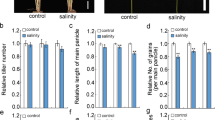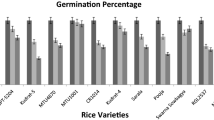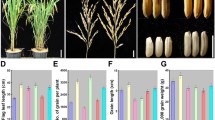Abstract
The rice grain filling process is of inordinate importance as it is directly associated with productivity and rice quality. Salt stress occurring during early grain development hinders seed development, resulting in yield penalty. To dissect transcriptional responses and to identify promising candidate genes, comparative expression profiling of key stress-responsive and yield-related genes was performed in developing (10 DAP, 20 DAP, and 30 DAP) and matured grains of salt-sensitive (IR-64) and salt-tolerant (Nonabokra) rice cultivars under salt stress (250 mM NaCl) along with the analyses of grain yield parameters. The phenotypic values of most of the tested yield attributes were significantly reduced under salt stress and the effect of stress was more pronounced in IR-64. Gene expression through semi-quantitative reverse transcriptase-polymerase chain reaction followed by statistical analyses identified that members of the TFs and LEA family (that is, TRAB-1, RITA-1, RISBZ1, WRKY-21, and Osem), osmolytes and polyamine metabolic genes (BADH1 and SAMDC) as well as the yield-related gene GIF1, were significantly induced by salt stress. Statistical analyses further revealed a significant correlation between the expression of these genes and grain yield under salt stress. In IR-64, the TRAB-1, RITA-1, and Osem transcripts were more up regulated during the early to mid-phase of seed development, suggesting an adaptive response of the sensitive cultivar to salt stress. The TFs along with BADH1, SAMDC, and GIF1 transcripts were mostly up regulated in Nonabokra during the early phase, and the level was maintained even after the mid-phase under stress. The heat map analysis also revealed the differential expression of genes between the two cultivars throughout the seed developmental stages. Our result indicated a possible interplay between ABA-inducible TFs and grain filling-related genes, allowing Nonabokra to maintain the grain filling process under stress condition. This is also evident by comparatively lower reduction of grain weight and filled-grain number in Nonabokra under stress. The role of different TFs in ABA-signaling in matured grains is clear by the accumulation of transcripts, especially in dry and ABA-imbibed seeds. Overall, our data established the correlation of grain yield with tolerance or susceptibility, accompanied by the expression of effector or regulatory genes.











Similar content being viewed by others
References
Abdullah Z, Khan MA, Flowers TJ (2001) Causes of sterility in seed set of rice under salinity stress. J Agron Crop Sci 187:25–32. https://doi.org/10.1046/j.1439-037X.2001.00500.x
Ahmadi A, Baker DA (1999) Effects of abscisic acid (ABA) on grain filling processes in wheat. Plant Growth Regul 28:187–197. https://doi.org/10.1023/A:1006223925694
Alexandrova KS, Conger B (2002) Isolation of two somatic embryogenesis-related genes from orchardgrass (Dactylis glomerata). Plant Sci 162:301–307. https://doi.org/10.1016/S0168-9452(01)00571-4
Anil VS, Krishnamurthy P, Kuruvilla S et al (2005) Regulation of the uptake and distribution of Na+ in shoots of rice (Oryza sativa) variety Pokkali: role of Ca2+ in salt tolerance response. Physiol Plant 124:451–464. https://doi.org/10.1111/j.1399-3054.2005.00529.x
Asch F, Dingkuhn M, Dorffling K (2000) Salinity increases CO2 assimilation but reduces growth in field-grown, irrigated rice. Plant Soil 218:1–10. https://doi.org/10.1023/A:1014953504021
Bai X, Cai Y, Nie F (1989) Relationship between abscisic acid and grain filling of rice and wheat. Plant Physiol Commun 3:40–41
Banerjee A, Roychoudhury A (2017) Epigenetic regulation during salinity and drought stress in plants: histone modifications and DNA methylation. Plant Gene 11:199–204
Barrett T, Wilhite SE, Ledoux P et al (2013) NCBI GEO: archive for functional genomics data sets—update. Nucleic Acids Res 41:991–995. https://doi.org/10.1093/nar/gks1193
Chen THH, Murata N (2011) Glycinebetaine protects plants against abiotic stress: mechanisms and biotechnological applications. Plant Cell Environ 34:1–20. https://doi.org/10.1111/j.1365-3040.2010.02232.x
Chen S-Y, Wang Z-Y, Cai X-L (2007) OsRRM, a Spen-like rice gene expressed specifically in the endosperm. Cell Res 17:713–721. https://doi.org/10.1038/cr.2007.43
Chen JB, Yang JW, Zhang ZY et al (2013a) Two P5CS genes from common bean exhibiting different tolerance to salt stress in transgenic Arabidopsis. J Genet 92:461–469
Chen T, Xu Y, Wang J et al (2013b) Polyamines and ethylene interact in rice grains in response to soil drying during grain filling. J Exp Bot 64:2523–2538. https://doi.org/10.1093/jxb/ert115
Das P, Nutan KK, Singla-Pareek SL, Pareek A (2015) Understanding salinity responses and adopting “omics-based” approaches to generate salinity tolerant cultivars of rice. Front Plant Sci. https://doi.org/10.3389/fpls.2015.00712
Do PT, Degenkolbe T, Erban A et al (2013) Dissecting rice polyamine metabolism under controlled long-term drought stress. PLoS ONE. https://doi.org/10.1371/journal.pone.0060325
Fabre D, Siband P, Dingkuhn M (2005) Characterizing stress effects on rice grain development and filling using grain weight and size distribution. Field Crops Res 92:11–16. https://doi.org/10.1016/j.fcr.2004.07.024
FAO (2010) The state of food insecurity in the world. ISBN 978-92-5-106610-2
Garg R, Tyagi AK, Jain M (2012) Microarray analysis reveals overlapping and specific transcriptional responses to different plant hormones in rice. Plant Signal Behav 7:951–956. https://doi.org/10.4161/psb.20910
Gurmani AR, Bano A, Ullah N et al (2013) Exogenous abscisic acid (ABA) and silicon (Si) promote salinity tolerance by reducing sodium (Na+) transport and bypass flow in rice (Oryza sativa indica). Aust J Crop Sci 7:1219–1226
Hakim MA, Juraimi AS, Hanafi MM et al (2014) The effect of salinity on growth, ion accumulation and yield of rice varieties. J Anim Plant Sci 24:874–885
Hasthanasombut S, Ntui V, Supaibulwatana K et al (2010) Expression of Indica rice OsBADH1 gene under salinity stress in transgenic tobacco. Plant Biotechnol Rep 4:75–83. https://doi.org/10.1007/s11816-009-0123-6
Hasthanasombut S, Supaibulwatana K, Mii M, Nakamura I (2011) Genetic manipulation of Japonica rice using the OsBADH1 gene from Indica rice to improve salinity tolerance. Plant Cell Tissue Organ Cult 104:79–89. https://doi.org/10.1007/s11240-010-9807-4
Hattori T, Vasil V, Rosenkrans L et al (1992) The Viviparous-1 gene and abscisic acid activate the C1 regulatory gene for anthocyanin biosynthesis during seed maturation in maize. Genes Dev 6:609–618
Hattori T, Terada T, Hamasuna ST (1994) Sequence and functional analyses of the rice gene homologous to the maize Vp1. Plant Mol Biol 24:805–810. https://doi.org/10.1007/BF00029862
Hattori T, Terada T, Hamasuna S (1995) Regulation of the Osem gene by abscisic acid and the transcriptional activator VP1: analysis of cis-acting promoter elements required for regulation by abscisic acid and VP1. Plant J 7:913–925
Hobo T, Kowyama Y, Hattori T (1999) A bZIP factor, TRAB1, interacts with VP1 and mediates abscisic acid-induced transcription. Proc Natl Acad Sci USA 96:15348–15353. https://doi.org/10.1073/pnas.96.26.15348
Huang X, Qian Q, Liu Z et al (2009) Natural variation at the DEP1 locus enhances grain yield in rice. Nat Genet 41:494–497. https://doi.org/10.1038/ng.352
Ibragimova SM, Trifonova EA, Filipenko EA, Shymny VK (2015) Evaluation of salt tolerance of transgenic tobacco plants bearing with P5CS1 gene of Arabidopsis thaliana. Genetika 51:1368–1375. https://doi.org/10.1134/S1022795415120078
Igarashi Y, Yoshiba Y, Sanada Y et al (1997) Characterization of the gene for delta1-pyrroline-5-carboxylate synthetase and correlation between the expression of the gene and salt tolerance in Oryza sativa L. Plant Mol Biol 33:857–865
Izawa T, Foster R, Nakajima M et al (1994) The rice bZIP transcriptional activator RITA-1 is highly expressed during seed development. Plant Cell 6:1277–1287. https://doi.org/10.1105/tpc.6.9.1277
Jain M, Nijhawan A, Arora R et al (2007) F-box proteins in rice. Genome-wide analysis, classification, temporal and spatial gene expression during panicle and seed development, and regulation by light and abiotic stress. Plant Physiol 143:1467–1483. https://doi.org/10.1104/pp.106.091900
Jin Y, Yang H, Wei Z et al (2013) Rice male development under drought stress: phenotypic changes and stage-dependent transcriptomic reprogramming. Mol Plant 6:1630–1645. https://doi.org/10.1093/mp/sst067
Kato T, Sakurai N, Kuraishi S (1993) The changes of endogenous abscisic acid in developing grain of two rice cultivars with different grain size. Jpn J Crop Sci 62:456–461. https://doi.org/10.1626/jcs.62.456
Khan MA, Abdullah Z (2003) Salinity–sodicity induced changes in reproductive physiology of rice (Oryza sativa) under dense soil conditions. Environ Exp Bot 49:145–157. https://doi.org/10.1016/S0098-8472(02)00066-7
Kim G-B, Nam Y-W (2013) A novel ∆1-pyrroline-5-carboxylate synthetase gene of Medicago truncatula plays a predominant role in stress-induced proline accumulation during symbiotic nitrogen fixation. J Plant Physiol 170:291–302. https://doi.org/10.1016/j.jplph.2012.10.004
Kumar V, Shriram V, Kishor PBK et al (2010) Enhanced proline accumulation and salt stress tolerance of transgenic indica rice by over-expressing P5CSF129A gene. Plant Biotechnol Rep 4:37–48. https://doi.org/10.1007/s11816-009-0118-3
Kumar V, Singh A, Mithra SVA et al (2015) Genome-wide association mapping of salinity tolerance in rice (Oryza sativa). DNA Res 22:133–145. https://doi.org/10.1093/dnares/dsu046
Lee T-M, Lur H-S, Chu C (1997) Role of abscisic acid in chilling tolerance of rice (Oryza sativa L.) seedlings. Plant Sci 126:1–10. https://doi.org/10.1016/S0168-9452(97)00076-9
Liu J, Jiang MY, Zhou YF, Liu YL (2005) Production of polyamines is enhanced by endogenous abscisic acid in maize seedlings subjected to salt stress. J Integr Plant Biol 47:1326–1334. https://doi.org/10.1111/j.1744-7909.2005.00183.x
Lutts S, Kinet JM, Bouharmont J (1995) Changes in plant response to NaCl during development of rice (Oryza sativa L.) varieties differing in salinity resistance. J Exp Bot 46:1843–1852. https://doi.org/10.1093/jxb/46.12.1843
Mahmood A, Latif T, Arif Khan M (2009) Effect of salinity on growth, yield and yield components in basmati rice germplasm. Pak J Bot 41:3035–3045
Miura K, Ikeda M, Matsubara A et al (2010) OsSPL14 promotes panicle branching and higher grain productivity in rice. Nat Genet 42:545–549. https://doi.org/10.1038/ng.592
Miyoshi K, Kagaya Y, Ogawa Y et al (2002) Temporal and spatial expression pattern of the OSVP1 and OSEM genes during seed development in rice. Plant Cell Physiol 43:307–313. https://doi.org/10.1093/pcp/pcf040
Mohammadi-Nejad G, Singh RK, Arzani A et al (2012) Evaluation of salinity tolerance in rice genotypes. Int J Plant Prod 4:199–208. https://doi.org/10.22069/IJPP.2012.696
Moons A, Bauw G, Prinsen E et al (1995) Molecular and physiological responses to abscisic acid and salts in roots of salt-sensitive and salt-tolerant Indica rice varieties. Plant Physiol 107:177–186
Movahedi S, Van de Peer Y, Vandepoele K (2011) Comparative network analysis reveals that tissue specificity and gene function are important factors influencing the mode of expression evolution in Arabidopsis and rice. Plant Physiol 156:1316–1330. https://doi.org/10.1104/pp.111.177865
Nakagawa H, Ohmiya K, Hattori T (1996) A rice bZIP protein, designated OSBZ8, is rapidly induced by abscisic acid. Plant J 9:217–227. https://doi.org/10.1046/j.1365-313X.1996.09020217.x
Nakase M, Aoki N, Matsuda T, Adachi T (1997) Characterization of a novel rice bZIP protein which binds to the alph-globulin promoter. Plant Mol Biol 33:513–522
Nakashima K, Yamaguchi-Shinozaki K (2013) ABA signaling in stress-response and seed development. Plant Cell Rep 32:959–970. https://doi.org/10.1007/s00299-013-1418-1
Negrão S, Courtois B, Ahmadi N et al (2011) Recent updates on salinity stress in rice: from physiological to molecular responses. Crit Rev Plant Sci 30:329–377. https://doi.org/10.1080/07352689.2011.587725
Panda BB, Badoghar AK, Sekhar S et al (2016) Biochemical and molecular characterisation of salt-induced poor grain filling in a rice cultivar. Funct Plant Biol 43:266–277. https://doi.org/10.1071/FP15229
Paul S, Roychoudhury A (2017a) Seed priming with spermine and spermidine regulates the expression of diverse groups of abiotic stress-responsive genes during salinity stress in the seedlings of indica rice varieties. Plant Gene 11:124–132. https://doi.org/10.1016/j.plgene.2017.04.004
Paul S, Roychoudhury A (2017b) Effect of seed priming with spermine/spermidine on transcriptional regulation of stress-responsive genes in salt-stressed seedlings of an aromatic rice cultivar. Plant Gene 11:133–142. https://doi.org/10.1016/j.plgene.2017.05.007
Paul S, Roychoudhury A (2018) Transcriptome profiling of abiotic stress-responsive genes during cadmium chloride-mediated stress in two indica rice varieties. J Plant Growth Regul 37:657–667. https://doi.org/10.1007/s00344-017-9762-y
Paul S, Roychoudhury A, Banerjee A et al (2017) Seed pre-treatment with spermidine alleviates oxidative damages to different extent in the salt (NaCl)-stressed seedlings of three indica rice cultivars with contrasting level of salt tolerance. Plant Gene 11:112–123. https://doi.org/10.1016/j.plgene.2017.04.002
Rad HE, Aref F, Rezaei M (2012) Response of rice to different salinity levels during different growth stages. Res J Appl Sci Eng Technol 4:3040–3047
Rao PS, Mishra B, Gupta SR (2013) Effects of soil salinity and alkalinity on grain quality of tolerant, semi-tolerant and sensitive rice genotypes. Rice Sci 20:284–291. https://doi.org/10.1016/S1672-6308(13)60136-5
Rengasamy P (2010) Soil processes affecting crop production in salt-affected soils. Funct Plant Biol 37:613–620. https://doi.org/10.1071/FP09249
Roychoudhury A, Banerjee A (2016) Endogenous glycine betaine accumulation mediates abiotic stress tolerance in plants. Trop Plant Res 3:105–111
Roychoudhury A, Basu S, Sengupta DN (2009) Comparative expression of two abscisic acid-inducible genes and proteins in seeds of aromatic indica rice cultivar with that of non-aromatic indica rice cultivars. Indian J Exp Biol 47:827–833
Roychoudhury A, Banerjee A, Lahiri V (2015) Metabolic and molecular-genetic regulation of proline signaling and its cross-talk with major effectors mediates abiotic stress tolerance in plants. Turk J Botany 39:887–910. https://doi.org/10.3906/bot-1503-27
Saeed AI, Sharov V, White J et al (2003) TM4: a free, open-source system for microarray data management and analysis. Biotechniques 34:374–378
Soda N, Kushwaha HR, Soni P et al (2013) A suite of new genes defining salinity stress tolerance in seedlings of contrasting rice genotypes. Funct Integr Genomics 13:351–365. https://doi.org/10.1007/s10142-013-0328-1
Song X-J, Huang W, Shi M et al (2007) A QTL for rice grain width and weight encodes a previously unknown RING-type E3 ubiquitin ligase. Nat Genet 39:623–630. https://doi.org/10.1038/ng2014
Thitisaksakul M, Tananuwong K, Shoemaker CF et al (2015) Effects of timing and severity of salinity stress on rice (Oryza sativa L.) yield, grain composition, and starch functionality. J Agric Food Chem 63:2296–2304. https://doi.org/10.1021/jf503948p
Wang Z-Q, Zhang H, Wang X-M et al (2007) Relationship between concentrations of polyamines in filling grains and rice quality. Acta Agron Sin 32:1922–1927
Wang E, Wang J, Zhu X et al (2008) Control of rice grain-filling and yield by a gene with a potential signature of domestication. Nat Genet 40:1370–1374. https://doi.org/10.1038/ng.220
Wang Z, Xu Y, Wang J et al (2012) Polyamine and ethylene interactions in grain filling of superior and inferior spikelets of rice. Plant Growth Regul 66:215–228. https://doi.org/10.1007/s10725-011-9644-4
Wang H, Wang H, Shao H et al (2016) Recent advances in utilizing transcription factors to improve plant abiotic stress tolerance by transgenic technology. Front Plant Sci. https://doi.org/10.3389/fpls.2016.00067
Xie Z, Zhang Z-L, Zou X et al (2005) Annotations and functional analyses of the rice WRKY gene superfamily reveal positive and negative regulators of abscisic acid signaling in aleurone cells. Plant Physiol 137:176–189. https://doi.org/10.1104/pp.104.054312
Yamamoto MP, Onodera Y, Touno SM, Takaiwa F (2006) Synergism between RPBF Dof and RISBZ1 bZIP activators in the regulation of rice seed expression genes. Plant Physiol 141:1694–1707. https://doi.org/10.1104/pp.106.082826
Yang J, Zhu Q, Wang Z, Cao X (1997) Polyamines in rice grains and their relations with grain plumpness and grain weight. Acta Agron Sin 23:385–392
Yang J, Zhang J, Wang Z et al (2001) Hormonal changes in the grains of rice subjected to water stress during grain filling. Plant Physiol 127:315–323. https://doi.org/10.1104/pp.127.1.315
Yang J, Zhang J, Liu K et al (2006) Abscisic acid and ethylene interact in wheat grains in response to soil drying during grain filling. New Phytol 171:293–303. https://doi.org/10.1111/j.1469-8137.2006.01753.x
Yang R, Yang T, Zhang H et al (2014) Hormone profiling and transcription analysis reveal a major role of ABA in tomato salt tolerance. Plant Physiol Biochem 77:23–34. https://doi.org/10.1016/j.plaphy.2014.01.015
Yu J, Lai Y, Wu X et al (2016) Overexpression of OsEm1 encoding a group I LEA protein confers enhanced drought tolerance in rice. Biochem Biophys Res Commun 478:703–709. https://doi.org/10.1016/j.bbrc.2016.08.010
Zha X, Luo X, Qian X et al (2009) Overexpression of the rice LRK1 gene improves quantitative yield components. Plant Biotechnol J 7:611–620. https://doi.org/10.1111/j.1467-7652.2009.00428.x
Zhang H, Tan G, Yang L et al (2009) Hormones in the grains and roots in relation to post-anthesis development of inferior and superior spikelets in japonica/indica hybrid rice. Plant Physiol Biochem 47:195–204. https://doi.org/10.1016/j.plaphy.2008.11.012
Zhao B, Liu K, Zhang H, et al (2007) Causes of poor grain plumpness of two-line hybrids and their relationships to the contents of hormones in the rice grain. Agric Sci China 6:930–940. https://doi.org/10.1016/S1671-2927(07)60131-X
Zou X, Seemann JR, Neuman D, Shen QJ (2004) A WRKY gene from creosote bush encodes an activator of the abscisic acid signaling pathway. J Biol Chem 279:55770–55779. https://doi.org/10.1074/jbc.M408536200
Acknowledgements
Financial assistance from Science and Engineering Research Board (SERB), Government of India through the research grant (SR/FT/LS-65/2010) and from Council of Scientific and Industrial Research (CSIR), Government of India, through the research grant [38(1387)/14/EMR-II] to Dr. Aryadeep Roychoudhury is gratefully acknowledged. The authors are thankful to University Grants Commission (UGC), Government of India, for providing Senior Research Fellowship to Saikat Paul.
Author information
Authors and Affiliations
Corresponding author
Electronic supplementary material
Below is the link to the electronic supplementary material.
Rights and permissions
About this article
Cite this article
Paul, S., Roychoudhury, A. Comparative Analysis of the Expression of Candidate Genes Governing Salt Tolerance and Yield Attributes in Two Contrasting Rice Genotypes, Encountering Salt Stress During Grain Development. J Plant Growth Regul 38, 539–556 (2019). https://doi.org/10.1007/s00344-018-9869-9
Received:
Accepted:
Published:
Issue Date:
DOI: https://doi.org/10.1007/s00344-018-9869-9




